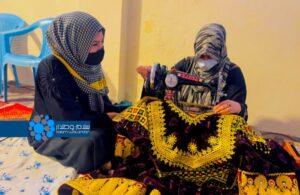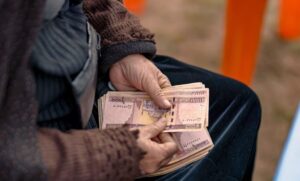KABUL (SW) – Salam Watandar’s findings from interviews with 24 female hairdressers show that after the closure of women’s hairdressing salons, a number of female hairdressers tried to migrate from the country.
The new restriction of the caretaker government of the Islamic Emirate on women has been imposed while among the women hairdressers interviewed in this report, 75% of them were the sole breadwinners of their families, who are now in a chaotic economic and psychological stress. Widows, orphaned girls and women and girls whose male family members are unable to work due to old age or disability are among the hairdressers interviewed in this report.
Najia Omari is a widow who takes care of her three children. For five years, she had a hairdressing salon in the “Old Makrorian” area of Kabul city, and thus provided for her children’s expenses. She says that with the closure of women’s hair salons, she has no way of earning to support her children financially, and now she is in a bad economic and psychological situation with her orphaned children. Najia adds: “The problems we faced were that I am a homeless woman and I live with my three children. I live alone with my three children. I don’t have family support, and still, the issue of house rent, the issue of food and expenses, the issue of education, the necessity of everything, that’s what I got from hairdressing.”
Nesa Saadati, the manager of one of the women’s hair salons in the Taimani Project area of Kabul, is also the sole breadwinner of her family of six. This lady, whose husband is paralyzed from the back, says that after the caretaker government imposed new restrictions on women hairdressers, she does not know what to do and who to reach out to for help. She adds: “My husband does not have work, he cannot do work. Because of this, the whole responsibility of the house is on me.”
Maswa Ahmadi, an orphan girl whose father died and whose mother is also paralyzed, says that she used to meet the needs of her family through hairdressing, and now that she has lost her job, the whole family is worried. She adds: “The only source that provided my family’s expenses was this barber shop because my father died about five years ago due to an illness he had and we didn’t have an elder brother to be the breadwinner. In my mother’s house, after my father’s death, the mental problems that he had appeared, he suffered a stroke and became paralyzed on one side of his body.”
In addition to these, women whose husbands are unemployed or girls who turned to hairdressing after the ban on education, suffer from bad economic and psychological conditions after the new order of the caretaker government.
Rouya Osmani, the manager of “Nice” hairdressing salon located in Makrorian, Kabul, said in an interview with Salam Watandar that her husband became unemployed after the regime change and now he is responsible for all household expenses.
She added: “My husband and I are unemployed right now. Believe in God, these four children were working from the morning up until the evening. Now that it is closed, believe that the economy has come to such an end that it is immeasurable.”
Narges (pseudonym), from Pol Khumri city, Baghlan center, who worked at the “Sham Paris” hairdressing salon, says that she suffered from mental illness and depression when women’s hairdressing salons were closed. She added: “Currently, our mental challenges are many, what else can we say? We women were put in a cage, tied up, we have no way to escape. In this current government, in my opinion, nothing is good for women. They took our work away from us, we are currently in a crisis and in the dark.”
Meanwhile, a number of other female hairdressers, in an interview with Salam Watandar, say that they have to leave the country due to the new restrictions imposed by the caretaker government on women.
Aziza Qasemi, a hairdresser in the west of Kabul city, said that she has no choice but to leave the country. She added: “There is no other way, of course there is no income, I will try my best to find a way and a solution for us to migrate.”
Mehtab Iftikhar, another female hairdresser who went to Iran illegally after the new restrictions were imposed, says: “I came here with many problems, Afghans are not allowed to open hair salons in Iran, and no matter how much capital we had.”
Meanwhile, Raha Hosni, a representative of hairdressers and an employee of trade union, mentioned the number of women’s hairdressing salons across the country as 12,000 hairdressing salons and says that at least five people were working in each of these hairdressing salons. According to her, about 60,000 women across the country have become unemployed after the closure of women’s hair salons.
She added: “Afghanistan, 12,000 women were working as hairdressers, and with the closure of hairdressing salons, if we count the average of five employees working in each salon, we count nearly 60,000 people who have lost their jobs and lost their income. and each of them was somehow the head of their family, the breadwinner of the family.”
On the other hand, women’s rights activists say that the caretaker government narrows the scope of women’s activities day by day and has no alternative economic plan for women.
Zainab Rezaei, a women’s rights activist, says that restrictions should be stopped and women should be allowed to work. She added: “Our wish is that they no longer continue with these excessive restrictions and allow women to use their rights.”
Soraya Paikan, another women’s rights activist, said: “In this regard, the government, of course, before doing this and closing the hair salons, should have prepared an economic plan for them or considered other work for them, which unfortunately do not exist in the current government.”
Despite all this, Mohammad Akif Mohajer, the spokesperson of the Ministry of Promoting Virtues and Prohibiting the Evil of the caretaker government, believes that the reason for the closure of women’s hairdressing salons is the non-compliance with the principles that were made available to hairdressers by the government with a 14-point bill.
However, many female makeup artists, in a conversation with Salam Watandar, state that they are unaware of the existence of such a bill.
Mohammad Akif Mohajer said: “Before we closed the barbershops, we had approved a 14-item bill. We had submitted the bill to the union. The union had sent it to all the hair salons. It said do not pluck eyebrows, do not cut and dye hair and do not paint your nails.”
New restrictions on women’s activities were imposed by the caretaker government while two years have passed since the ban on girls’ education above the sixth grade. Women’s education and activities in public and private universities and institutions have also been banned.
ENDS






